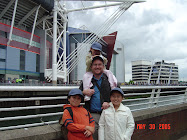This summer, we have been solving puzzles. One puzzle board is set on the dining table at a time and whenever someone needs a break from whatever they are doing they'd go sit down at the table and try to fit a piece or more depending on the time available. The one previous one we worked on took us more than a week to put together. And when we were down to the last piece, we had to wait for everyone to be there and Brahms makes the sound effects for drama, for the final piece to be added. I contribute very little in these puzzle activities, but I make sure to put at least a few pieces in place.
Life is like solving a puzzle. We have a big picture to put together. The resources are there but they come in small pieces and scattered around. The pieces are in the wrong places. In solving the puzzle you are trying the wrong piece in the wrong position or the right piece at the wrong angle. Here are some of the simple truths I've learned just by watching my family work on the puzzles.
Perception and focus determines the length of time involved in the completion of your puzzle. Scattered pieces require a collected mind. Every time a piece is set in position a mini success is achieved. And it all begins in your grasp as to the way pieces appear and extrapolation as to their best possible position on the board. Each piece carries a clue as to its position in the big picture and discerning that clue is what we the challenge is.
Attention to detail is key to finding the right piece for a specific position. Puzzle pieces look the same at first glance but each one is made different no matter how much they seem to resemble each other.
Ease and security are the real test to the right fit. Given the permission I would trim pieces to fit into the puzzle. Sometimes that's how we deal with life - trying everything to make the wrong piece fit. It is my observation that this will only create more problems - deeper problems. The right piece is still somewhere waiting to be found.
Team work can make the the journey more fun. Sometimes we feel alone in our endeavors but in fact there are those around us who are working with us. Don't try to do everything.
Distractions are necessary every once in a while to reset our impressions about a particular piece. Trying the same piece into the same place over and over again is not progress so it is a good idea to go do something else. When another problem solving time comes again, you might be able to see it differently.

























No comments:
Post a Comment
Leave a Response